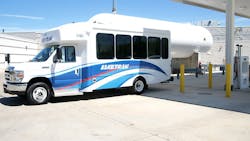Propane offers flexible, cost-effective alternative fuel option to fleets
The U.S. is one of the top producers of the third most popular transportation fuel in the world: propane autogas. There are an estimated 28 million propane vehicles worldwide and more than 60,000 propane school buses, transit shuttles and commercial trucks on U.S. roads.
One of the reasons propane is so popular is that it has a robust, reliable and flexible infrastructure with decades of research and development behind it. Propane poses no groundwater, surface water or soil, so infrastructure can be installed in areas where other traditional and alternative fuels cannot. Because there are fewer financial and geographical constraints with propane infrastructure, transit agencies can easily integrate propane affordably, reduce costs and eliminate range anxiety. Propane also costs 40-50 percent less per gallon than conventional fuels like diesel or gasoline.
Propane fueling options
There are three main options for propane fueling infrastructure: onsite, mobile and public. It’s less expensive to install a propane station than it is to install a CNG, diesel, gasoline or electric station. There are thousands of propane suppliers across the country that specialize in helping fleets choose the right fueling option based on fleet size, routes, budget and facility space.
The most common option for fleets is onsite fueling. Propane suppliers offer a suite of services to help customers determine how to install onsite infrastructure, including the management of permitting and legal requirements.
“Permanent equipment is the most common application because there’s flexibility and room for growth,” said Bryan Raygor, national business manager for autogas at Ferrellgas, a nationwide propane supplier. “As a fleet begins operating with autogas, it can start small and then grow the propane fueling station equipment by adding additional tanks and dispensers.”
Funding and support
When fleets work closely with a propane supplier, there are often additional benefits, including financial support for low- and no-cost infrastructure installation, equipment maintenance, training and more.
“We’ll do the training, the maintenance, the fuel management and the tracking,” Raygor said. “We want to be a part of that process.”
There are also many incentive programs to help save on the upfront costs. More information can be found on the Propane Education & Research Council website.
Some propane transit buses on the market, such as the ROUSH CleanTech Ford E-450, have completed the Federal Transit Administration’s (FTA) New Model Bus Testing Program (Altoona Testing). Completion of Altoona Testing allows operators to access federal funds that cover 85 percent of the entire vehicle cost with a 15 percent local match. It also means all compatible paratransit body configurations are eligible for FTA funding. The ROUSH CleanTech Ford E-450 also meets all federal Buy America standards.
Infrastructure across America
Hundreds of transit agencies operate more than 7,000 propane vehicles today. Many choose to include propane buses in their diverse fleet portfolio to meet their community’s sustainability goals while driving down costs.
Suburban Mobility Authority for Regional Transportation (SMART) in Michigan operates a 100 percent propane paratransit fleet that travels nine million miles annually. After assessing the fleet’s services and size, agency officials chose to install three onsite fueling stations, with two 19,000-gallon tanks located at each station. SMART took advantage of the low cost of building the fueling station infrastructure.
TransNet, a public transit agency in Pennsylvania, worked with two route partners — Bux-Mont Transportation and Tri-County Transit — to install onsite propane stations. The decision to have each agency install its own private fueling station was made so that the fuel is easily accessible and provides fueling opportunities throughout the day. For the agency, this was a win-win for everyone. Staff from ROUSH CleanTech traveled to each partner site to provide training to maintenance and fueling staff. The adoption of propane buses with an onsite fueling station supported TransNet in reaching its sustainability goals and reducing its carbon footprint.
About the Author

Todd Mouw
Executive Vice President of Sales and Marketing
Todd Mouw is executive vice president of sales and marketing for ROUSH CleanTech, an industry leader of alternative fuel vehicle technology. Mouw has served as president of the NTEA Green Truck Association.
